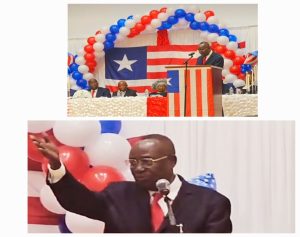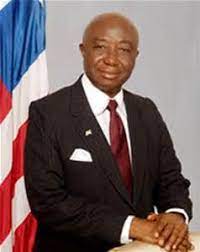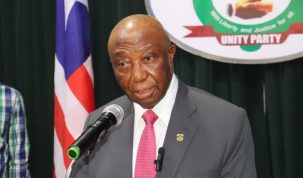Since the outbreak of the Liberian civil war in December 1989, our nation has endured immense suffering — the destruction of food supplies, crops, and agricultural infrastructure; the disintegration of families and communities; the displacement of millions; and the collapse of educational, health, and sanitation systems.
Yet, beyond these physical devastations, the most severe damage lies in the minds of Liberia’s children — those who witnessed and endured unimaginable violence. The wounds of war on young people, from physical injury to gender-based violence and deep psychological trauma, continue to cripple Liberia’s human resource development. Armed conflict affects every aspect of a child’s development — physical, mental, emotional, and social.
Today, the danger continues in a new form: the rise of narcotic drug use among Liberian youth. Adolescents, whose brains are still developing, are especially vulnerable to the destructive effects of substances like kush, a synthetic drug now ravaging communities across Liberia. As former President George Weah rightly warned, “Losing young people to drugs will adversely affect the country’s human capital, thus impeding national development.”
The Lost Generation — Liberia’s “Zogos”
According to Euronews (2021), a government survey found that 91 percent of Liberia’s street-dwelling “Zogos” — young people addicted to drugs and living on the margins — are men. These youths, once child soldiers or victims of war, now face rejection and stigma within a patriarchal society that already assigns them the lowest social rank.
The civil war left lasting scars on the physical and mental health of Liberia’s children. Many grew up in refugee camps, displaced communities, or war zones, losing access to healthcare, education, and basic necessities. Before the conflict, Liberia had a functioning medical system and a cadre of physicians; during the war years, these capacities collapsed.
Graca Machel, Expert of the UN Secretary-General on Children and Armed Conflict, reported that children exposed to war often suffer anxiety, depression, nightmares, and difficulty concentrating. Many withdraw from others, lose hope, or display aggression — all symptoms now mirrored in Liberia’s drug-affected youth.
The recommendations below were generated from the Report by Graca Machel, Expert of the Secretary-General of the United Nations. These recommendations were put in place at the international level to help solve some the problems these child soldiers were confronted with daily.
A. Programmes at the national and local levels, should be designed to place special emphasis on providing appropriate educational and recreational activities for adolescents affected by armed conflicts.
B. Special efforts should be made for demobilized adolescent soldiers, such as projects which offer alternative livelihoods and promote their reintegration into their communities. Human resources development, including youth education, employment and training schemes, should be promoted.
C. Intergovernmental bodies, United Nations agencies and other organizations should support Governments in strengthening national legislative frameworks challenging any aspect of discrimination against women, and girls.
Dr. Joy D. Osofsky, Professor of Public Health and Psychiatry at Louisiana State University, draws a parallel between children in war zones and those growing up amid inner-city violence. In both cases, exposure to violence disrupts emotional stability, trust, and learning — and increases the risk of antisocial behavior and substance abuse.
The Need for National Rehabilitation and Reintegration:
To address these challenges, the UN recommends community-based programs that focus on education, recreation, and vocational training for adolescents affected by war. Special reintegration initiatives for demobilized youth can provide alternative livelihoods, restore dignity, and promote social inclusion.
Unfortunately, successive Liberian administrations have failed to implement such policies effectively. The absence of a coherent youth development agenda has left thousands idle and hopeless. Adolescents, with their energy and potential, should not be treated as mere victims but as active participants in rebuilding the nation.
Vocational institutions such as the Booker T. Washington Institute and others must be strengthened and supported to provide practical skills training for former child soldiers and vulnerable youth. A national postwar vocational curriculum should be developed under the guidance of the Ministry of Education to help mold minds and rebuild lives.
As one University of Liberia student, Francis G. Boayue, aptly wrote in The Perspective (2019): “I urge the Drug Enforcement Agency to be more proactive than ever before in eradicating cocaine, opium, and other dangerous drugs from the Liberian market to rescue young people dependent on these harmful substances.”

Conclusion: A National Call to Action
The plight of Liberia’s “Zogos” has become a national disgrace. Their rehabilitation and reintegration are not solely the government’s responsibility — they demand a collective effort from the religious community, civic organizations, political leaders, and the business sector.
Reintegration programs must help young people reconnect with their families and communities, offering education and vocational opportunities that prevent relapse into violence or crime. As President Weah noted, the rehabilitation of drug-affected youth requires an estimated $13.9 million — a critical investment in the future of Liberia.
The success and stability of our nation depend on how we respond to this crisis. Illiteracy and addiction are the twin perils threatening Liberia’s future. The 14 years of war taught us the cost of neglecting our youth. We cannot afford to repeat that mistake.
The current administration under President Joseph Boakai must confront this epidemic with urgency. Those who traffic or distribute kush should face severe penalties, as their actions constitute an assault on the very survival of the Liberian nation.
 About the Author:
About the Author:
Mr. Edmund Zar-Zar Bargblor is an educator and a graduate of Cuttington University (Liberia), Howard University (Washington, D.C.), and the Israel Institute of Technology (Haifa, Israel). He is a former Deputy Managing Director of the National Port Authority of Liberia and can be reached at [email protected]





